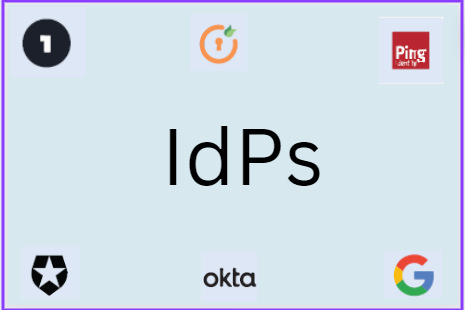IdPs What They Are and Why You Need Them
Date Created: 12 Oct 2023Share:
In our increasingly digital world, the management of online identities and user access to applications and resources has become a critical concern for both individuals and organizations.

What They Are and Why You Need Them
In our increasingly digital world, the management of online identities and user access to applications and resources has become a critical concern for both individuals and organizations. Identity providers, often referred to as IdPs, have emerged as a solution to these challenges. In this blog, well explore what identity providers are, how they work, their numerous benefits, and how to choose the right one for your needs.
What is an Identity Provider (IdP)?
An Identity Provider (IdP) is a platform responsible for establishing, upkeeping, and overseeing digital identities for users. These digital identities encompass diverse personal and organizational details like usernames, email addresses, and user preferences. The core role of an IdP is to verify users identities and provide them secure and efficient access to a variety of applications and resources.
How Do IdPs Work?
To gain a better grasp of how IdPs operate, lets break down the procedure:
User Request: When a user intends to access an application or resource
connected to an IdP, they get redirected to the IdPs login page.
Authentication: The user is then required to input their credentials,
usually a combination of a username and password, on the IdPs login page.
Token Generation: Following successful authentication, the IdP generates a
Security Assertion Markup Language (SAML) token. This token contains essential
information about the users identity and authentication.
Access Authorization: The SAML token is sent back to the application that the user is attempting to access. The application employs this token to verify the users identity and grant them access.
This streamlined process ensures centralized, secure, and convenient user authentication, proving highly beneficial for both consumers and businesses.
Benefits of Using Identity Providers
Utilizing Identity Providers brings forth a multitude of advantages that can profoundly enhance your online interactions, whether youre an individual or an organization. Here are the key benefits:
Elevated Security: Security is of utmost importance in the digital realm. IdPs
bolster security by centralizing user authentication and eliminating the
necessity for users to create and manage multiple passwords. This diminishes
the risk of password-related breaches and fortifies overall data protection.
Alleviated Password Fatigue: Handling numerous usernames and passwords for
various online services can be quite a hassle. IdPs alleviate password fatigue
by enabling users to log in to different applications using their existing IdP
credentials. This simplifies the login process and enhances user convenience.
Enhanced User Experience: IdPs offer a Single Sign-On (SSO) experience,
permitting users to access multiple applications with a single set of
credentials. This not only streamlines the user experience but also diminishes
the hassle associated with recalling and entering numerous passwords.
Streamlined IT Administration: For organizations, managing user accounts and access permissions can be a complex and time-consuming endeavor. IdPs streamline IT administration by reducing the quantity of accounts that require management. Consequently, this leads to a more efficient and cost-effective approach to identity management.
Examples of Identity Providers
Several popular IdPs are widely used today, catering to a diverse range of users and organizations. Some of the well-known identity providers include:
Google Sign-In: Googles authentication service that allows users to log in
to various web services using their Google accounts.
Facebook Login: Facebooks IdP, enabling users to access third-party
applications and websites using their Facebook credentials.
Microsoft Azure Active Directory: Microsofts cloud-based identity
and access management service, providing secure authentication and
authorization capabilities.
Okta: A comprehensive identity and access management platform that offers
Single Sign-On (SSO) and other security features.
Auth0: A flexible identity management platform known for its robust authentication and authorization capabilities.
How to Choose an Identity Provider
Selecting the appropriate Identity Provider for your specific requirements is of paramount importance. When making this critical decision, take the following factors into account:
Security Features: Ensure that the chosen IdP offers the necessary security
features tailored to your unique use case. This may encompass elements such as
two-factor authentication (2FA) and support for multi-tenant environments,
which can substantially fortify the security of your system.
User-Friendliness: The IdP should be user-friendly for both end-users and
administrators. A seamless and user-intuitive login experience is vital for
encouraging user adoption. Administrative tools should be designed to simplify
the management of user identities and access controls.
Integration Capabilities: Assess the IdPs ability to seamlessly integrate
with the applications and resources you plan to employ. The ease of integration
and compatibility can significantly affect the efficiency and effectiveness of
your identity management system.
Pricing Structure: Compare the pricing models of various IdPs to find one that aligns with your financial resources. Keep in mind that some providers may offer free or budget-friendly options, but more advanced features could come at a premium. Weigh the costs against the features you require to make an informed decision.
In conclusion, Identity Providers have revolutionized how we manage online identities and access to digital resources. Whether youre an individual looking to simplify your online experiences or an organization aiming to enhance security and streamline user management, IdPs offer a compelling solution.
If youre considering implementing Single Sign-On (SSO) with SAML 2.0 identity providers, youre in luck. Cripsa, a leading provider in this space, offers robust support for all SSO SAML 2.0 identity providers. This support ensures that you can seamlessly integrate your chosen IdP with Cripsas services, further enhancing your identity and access management capabilities.
By
leveraging the power of Identity Providers, you can enjoy a more secure,
user-friendly, and efficient online experience, whether for personal use or to
drive your organizations digital initiatives. So, take advantage of the
benefits of IdPs and elevate your digital identity and access management to the
next level.

